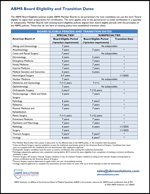What are the board eligibility periods according to the policies?
A candidate’s eligibility for board certification (board eligible period) expires on a date determined by the ABMS Member Board. For initial certification in a specialty, that date must be no fewer than 3 and no more than 7 years following the successful completion of accredited training. For initial certification in a subspecialty, that date must be no more than seven (7) years following the candidate’s successful completion of Member Board recognized subspecialty training. In addition, individual Member Board requirements must be met, including time in practice required (if any) for admissibility to the qualifying or certifying examination. ABMS Member Boards with existing board eligibility policies aligned their board eligible periods with the principles of the established ABMS policies. Member Boards that did not have an existing policy in place established transition dates for their candidates.
Why were these policies established?
Allowing an unrestricted status of “board eligibility” denigrates the status of those physicians who already have achieved board certification. These policies tighten the connection between training and certification by limiting the period of time that may elapse between a physician’s completion of an ACGME-accredited residency program and achievement of initial certification in a specialty or subspecialty. Research has shown that physicians can lose knowledge and skills as the years pass after their training. The requirements of ABMS Continuing Certification/MOC programs address this problem through continuing professional development.
Are there any exceptions to these limits?
The ABMS Member Boards may grant exceptions in instances of military deployment, acute illness, or other circumstances. Boards may make temporary alterations related to COVID-19. For more information, contact the Member Board directly.
What happens if a physician’s board eligibility lapses?
When a candidate’s board eligibility lapses, the physician must cease and desist from making any representations of board eligibility. Any violation of this rule is considered a breach of ethical standards of medical practice. The candidate no longer is eligible for certification in that specialty or subspecialty without first completing all requirements for re-establishing board eligibility set by the particular ABMS Member Board. Entering into this process may not restore board eligibility status. Each board determines whether a candidate can represent themselves as board eligible during the period in which they are completing requirements. The physician will not appear in the ABMS database or on ABMS Solutions displays/products.
What is the process to re-establish board eligibility?
Requirements vary by Member Board and can include completion of pre-approved topic specific activities or modules, assessment of knowledge or practice performance, payment of fees, supervised practice, program director attestation, retraining in an accredited residency program for six months to one year or more. The Member Boards also may limit the number of times that a candidate can re-establish board eligibility. For specific questions regarding an individual physician, contact the appropriate Member Board.
Once re-established, how many additional years of eligibility does the physician have before initial certification must be achieved?
Once re-established, the ABMS Member Boards generally allow a candidate a single board eligibility period before initial certification in a specialty or subspecialty must be achieved. Contact the appropriate Member Board regarding specific questions about the duration of the re-established board eligibility period.

